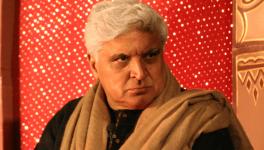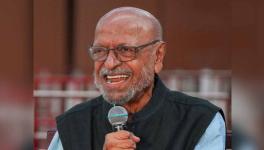Is it a Welcome Crisis in Bollywood?
Representational use only.Image Courtesy: adglighting.com
Cinema as an art form captures societal changes at their authentic best. It is authentic because mainstream cinema depicts reality’s nuances un-reflexively. Script-writer Javed Akhtar once said he and producer-screenwriter Salim Khan had no idea they were creating the angry young man phenomenon with their films. They were “breathing the same air” and penned what they felt, like many others in those days. People could relate because their films captured the moment. Their movies could resonate with felt experiences, emotions, and collective subconscious. Cinema was seen as a medium to express collective feelings. It was like being part of a conversation and a way to clarify and vindicate feelings. Films unravelled a mystery whose subplot we knew but still wished someone else would narrate back to us as a good, pleasurable story.
With invasive technologies, social media and Google mapping our every move, collective experiences and popular culture have broken down into serialised moments. It is far more challenging to construct a collective, as what we say and experience seem to be at cross-purposes. We are less confident and more unsure about what we are going through, but we are more self-righteous. Life is less certain and secure yet more predictable than ever before.
Our urge for more intensity is growing, but not for mystery. We listen less, but we are more vocal. We have more external aggression, but we have hit a pause on our ability for self-reflection. We wish for more security with absolute intolerance for repetitiveness, and suffer from chronic boredom. We can pretend and delude ourselves but continue to look for contextual authenticity.
Since honesty, heroism, and idealism have become the virtues of the privileged, we detest being unheroic. It would reflect our perpetual vulnerability. All of these have made audience choices challenging to predict. The only certain thing is our focus has turned to very lived and everyday problems but without a compulsive moral frame. It does not mean there is no normative content, but that must emerge from within a context, as an organic choice of the actors involved rather than our external commitment to something larger. As is evident in our current political choices, to feel unadulterated, our choices must seem unmediated and direct. That is why films handle social complexity through innocuous-looking everyday problems.
The only movies that have done somewhat consistently well depict small towns and focus on fundamental issues such as unemployment, financial security, sexuality, inter-generationality within families, outdated traditions, and women’s selfhood, among other topics. In all such movies, the protagonist finds her way not out of pre-determined morality but from what is most feasible in the context. Sarcasm, dark humour, and situational comedy are the genres that seem to “capture” the current mood best. These trends seem to be the only somewhat consistent fare provided by relatively successful movies. All the rest, fantasy or action thrillers, have had cameo roles.
The mood in cinema is strangely rebellious but conscious of its limits. This energy comes from the ability to see the possibility of change without the excitement of ushering in a “revolutionary change”. It can go to extremes to achieve something small but significant and formidable. It is about doing rather than thinking. Thinking arrives as an act of doing. In essence, it signifies a certain kind of social democratisation without the accompanying opportunities to realise them. It can be seen as a way to realise aspirations but constrainedly. Cinema’s mood is not about setting moral exemplars but having a knack for identifying minute possibilities. It is about achievement without glorifying it. This is pretty complex as it needs to squeeze meaning and flair out of everyday banality.
Today, Hrishikesh Mukherjee’s films are the only ones that seem relatable to what cinema produced in the 1970s. His films seem contemporary as they dealt with tiny but real problems ordinary folks face, resolved without overwhelming or overbearing moral sensibilities though they were about being a Good Samaritan. His movies seem to say, what is good is specific to a context and may not provide a helpful frame for what is yet to come. It was difficult to slot Mukherjee’s movies as supportive or critical of traditions. Whether they wanted change or asked us to adjust to how things are was an equally unsure territory. But they had a certain laid-back pace and songs with lyrics like simple conversations set to melodious music. This is a genre as tricky to achieve as it is durable.
Movies on small-town characters have had the same self-gaze; of coping by making fun of the situation’s complexity, poking fun at oneself or the protagonist’s ethical dilemmas. These seem relatable because they allow us to think and act the way we choose. We do not have to be dimwits—Laal Singh Chaddhas—to do this. We can manage in more self-conscious ways. We are prepared to resist power and evil, but with the awareness that what could replace it will not be utopian, but only contextually and momentarily better. This also gives us more collective ability to live with and reconcile to more brazen violations. We are not in a hurry to shoot down the evil, as we have not been blindfolded into celebrating pure goodness. We are willing to play along without necessarily agreeing.
I suspect films that capture this sensibility—subtle and complex—will find a responsive audience. Our intelligence lies in our ability to remain non-committal. We are willing to put up with details (like in the Netflix series Sacred Games) if they tell us about stark reality, and we are also perfectly alright with flaky stuff if it entertains us. We still seek intensity but are unwilling to get lost in it.
Films and literature come closest to resonating with the collective subconscious. A crisis in these genres would hold a very significant meaning. So, we must acknowledge the new sensibilities at play. The boycott or cancel culture is not as much of a problem as it is an after-effect of resentment against propaganda culture. Propaganda has made us good sceptics. We have stopped watching television for some time now. Now it’s Bollywood’s turn.
The author is an associate professor at the Center for Political Studies, Jawaharlal Nehru University. His book, Politics, Ethics and Emotions in ‘New India’, will be published by Routledge, London, in 2022. The views are personal.
Get the latest reports & analysis with people's perspective on Protests, movements & deep analytical videos, discussions of the current affairs in your Telegram app. Subscribe to NewsClick's Telegram channel & get Real-Time updates on stories, as they get published on our website.
























